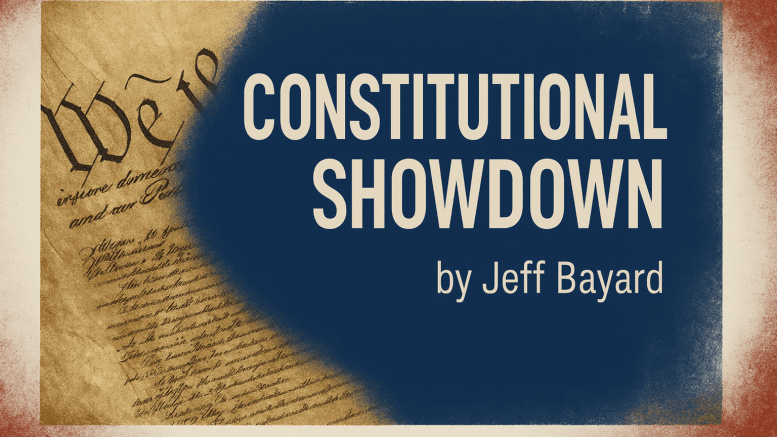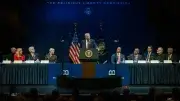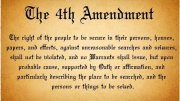The Virginia Christian Alliance continues our Constitutional Showdown series framed from the Christian Worldview and Constitutional originalism, exposing how government corruption violates both biblical stewardship principles and the framers’ original intent while equipping believers to defend constitutional limits through faithful citizenship and prayer.
Why Trump’s $4.9 Billion Foreign Aid Fight Could Save Your Tax Dollars Forever
When President Trump used a rare “pocket rescission” to withhold $4.9 billion in foreign aid, most Americans had no idea they were witnessing the exposure of one of the most corrupt government agencies in modern history. What looked like a budget dispute was actually a constitutional showdown that revealed how your tax dollars fund political corruption disguised as charity.
What Is Pocket Rescission and Why Should You Care?
The Trump pocket rescission strategy represents the first use of this constitutional tool in nearly 50 years. Unlike normal budget processes, pocket rescission allows presidents to effectively cancel congressional spending by timing their rescission requests so close to the fiscal year end that Congress cannot respond.
On September 26, 2025, the Supreme Court sided with Trump’s pocket rescission by a 6-3 vote, allowing him to withhold $4.9 billion in congressionally appropriated foreign aid. But this wasn’t just about foreign policy—it exposed systematic corruption that had turned USAID into what experts call “a true one-hand-washes-the-other stop for politicians who deal in favors.”
The constitutional stakes couldn’t be higher: When Congress appropriates money for programs exceeding constitutional authority, does the Executive violate his oath by spending such funds or by refusing to spend them?
The Shocking Truth About Where Your Foreign Aid Tax Dollars Really Go
The Trump pocket rescission revealed disturbing evidence of how USAID transformed from legitimate foreign aid into a political slush fund. Congressional investigations uncovered a system where politicians used taxpayer money to buy favors abroad while bureaucrats enriched themselves through the revolving door.
The Biden Family Ukraine Scandal: Rep. Marjorie Taylor Greene exposed how “Biden threatened, and it’s on video, to withhold 1 billion of USAID grant to Ukraine if Shokin wasn’t fired”—the prosecutor investigating Hunter Biden’s company Burisma.
The Dark Money Network: USAID became infiltrated by left-wing organizations:
- Ann Van Dusen (25 years at USAID) → Arabella Advisors (left-wing dark money hub)
- At least 5 former USAID staff → George Soros’s Open Society Foundations
- $270 million in USAID funds went to Soros operations that “spurred first Trump impeachment”
Personal Enrichment: Former USAID Administrator Samantha Power’s reported wealth increased from $8.8-29 million when she started to $12-30.5 million when she left—suspicious for someone earning a government salary.
How $70,000 for a “DEI Musical” Proves Government Waste Is Out of Control
The Trump pocket rescission exposed specific examples of wasteful spending that will shock taxpayers. A 2019 government report found 43% of USAID awards achieved only half their intended results, while billions disappeared into questionable programs:
Ridiculous Spending Examples:
- $70,000 for a DEI musical in Ireland
- $1.5 million for DEI programs in Serbia
- Hundreds of thousands to terrorist-linked organizations
- Millions to EcoHealth Alliance (Wuhan lab research)
- “Hundreds of thousands of meals to al Qaeda-affiliated fighters in Syria”
Cover-Up Operations: The Washington Post revealed that “Eight USAID inspector general auditors sounded the alarm that negative findings were removed from final reports.” When Egypt arrested 43 NGO workers for illegal operations, USAID quietly paid Egypt $4.6 million to bail out the Americans—essentially bribing a foreign government to cover up illegal activities.
This systematic fraud explains why Trump’s pocket rescission strategy was constitutionally necessary to protect taxpayer interests.
Why Christians Should Question $110 Billion in “AIDS Relief” Spending
Many Christians supported PEPFAR (President’s Emergency Plan for AIDS Relief) believing it represented biblical charity. But the Trump pocket rescission exposed how this $110+ billion program had been corrupted from its 2003 mission into anti-Christian ideology promotion.
Bush’s Original Christian Vision (2003):
- Life-saving AIDS treatment for dying patients
- Prevention of mother-to-child HIV transmission
- Healthcare infrastructure in devastated communities
- Faith-based partnerships respecting local values
How Liberal Mission Creep Corrupted Christian Charity: Over 22 years, bureaucrats transformed AIDS relief into cultural imperialism:
- $4 million for “global LGBTQI+ awareness” programs
- Abortion services (documented violations in Mozambique)
- “Feminist Democratic Principles” training in Africa
- Democratic regime change operations disguised as health programs
Heritage Foundation scholars correctly noted: “Using PEPFAR’s massive financial power to force an alien social agenda on unwilling communities amounts to cultural imperialism and neocolonialism.”
The Trump pocket rescission protected Christian taxpayers from funding programs that violated biblical principles while claiming to represent Christian charity.
Constitutional Crisis: When Congress Funds Programs It Has No Authority to Create
The Trump pocket rescission forced a fundamental constitutional question: Where does Congress get authority to fund LGBTQ+ promotion abroad? Article I, Section 8 lists specific congressional powers, but cultural transformation in foreign countries isn’t among them.
Unconstitutional Programs Trump Challenged:
- $4 million for “global LGBTQI+ awareness” (no enumerated power for sexual ideology export)
- $3.9 million for LGBTQI+ “democracy” in Western Balkans (cultural imperialism)
- $2 million for “Feminist Democratic Principles” in Africa (ideological transformation)
- $322 million “Democracy Fund” conducting “election meddling in foreign countries”
The Framers’ Original Intent: Operating under “Laws of Nature and Nature’s God,” the Constitution’s framers never intended federal agencies to become ideological export machines forcing American social politics on unwilling societies.
The constitutional question becomes: When Congress exceeds its enumerated powers, does the Executive violate his oath by spending such appropriations or by refusing to spend them? Trump’s pocket rescission argued that faithful constitutional execution sometimes requires resistance to congressional overreach.
The Executive’s Biblical and Constitutional Duty
From a Christian constitutional perspective, Trump was not violating congressional authority—he was fulfilling his biblical and constitutional obligation to be a faithful steward of taxpayer money. Scripture commands: “Let every person be subject to the governing authorities. For there is no authority except from God” (Romans 13:1). But when human authorities command what violates God’s law and constitutional limits, biblical precedent supports principled resistance.
The Higher Law Principle: When Congress appropriates money for programs that:
- Exceed enumerated constitutional powers
- Corrupt genuine Christian charity into political manipulation
- Fund anti-American and anti-Christian activities abroad
- Enrich political cronies through corruption schemes
- Violate national sovereignty through cultural imperialism
Does the Executive violate his constitutional oath by spending such money or by refusing to spend it?
The Constitutional Answer: The Executive’s oath requires defending the Constitution against all enemies, foreign and domestic. When congressional appropriations exceed constitutional authority, faithful execution means refusing to execute unconstitutional directives, not blindly following them.
The Biblical Answer: “We must obey God rather than men” (Acts 5:29). When human law conflicts with divine law and constitutional limits, faithful stewardship requires resistance to corruption, not participation in it.
Supreme Court’s 6-3 Decision: What the Pocket Rescission Ruling Really Means
The Supreme Court’s September 26, 2025 decision represents a constitutional watershed moment, though the Court avoided the deeper questions. In a 6-3 unsigned order, the conservative majority allowed Trump’s pocket rescission while the liberal justices warned about executive overreach.
What the Court Did: The majority focused on procedural issues, claiming the Impoundment Control Act bars private lawsuits challenging spending decisions. They avoided ruling on whether executives must spend money on unconstitutional programs.
Justice Kagan’s Constitutional Warning: Writing for the liberal dissent, Kagan identified the real stakes: “At issue is the allocation of power between the Executive and Congress over the expenditure of public monies.” She warned the Court was operating in “uncharted territory.”
The Unanswered Question: By using procedural grounds, the Court ducked the fundamental constitutional issue: When Congress appropriates money for programs outside its enumerated powers, which branch violates the Constitution—the Executive who spends it or the Executive who refuses?
Trump’s pocket rescission strategy forced this constitutional confrontation, even though the Court tried to avoid deciding it.
Biblical Principles Every Christian Should Know About Government Spending
Scripture provides clear guidance on how government officials should handle taxpayer money. The Trump pocket rescission applied these biblical principles to constitutional governance in ways every Christian should understand.
Faithful Stewardship Required: “Moreover, it is required of stewards that they be found faithful” (1 Corinthians 4:2). Government officials are stewards of taxpayer funds, not servants who must execute every directive regardless of constitutional limits.
Resistance to Corruption Commanded: “Have nothing to do with the fruitless deeds of darkness, but rather expose them” (Ephesians 5:11). When government programs fund anti-Christian ideologies or terrorist-linked organizations, faithful officials must resist.
Higher Law Principle: “We must obey God rather than men” (Acts 5:29). When human laws conflict with divine law and constitutional limits, biblical precedent supports principled resistance to corruption.
Divine Authority in Government: “The Most High rules the kingdom of men” (Daniel 4:25). Civil government derives authority from God and must operate within the bounds established through natural law and constitutional limits.
The Trump pocket rescission demonstrated how these biblical principles apply to modern constitutional governance.
Why This Pocket Rescission Victory Matters for Your Tax Dollars
Trump’s pocket rescission success represents more than a budget dispute—it’s a constitutional precedent that could protect taxpayers from funding government corruption for years to come.
Immediate Impact: The $4.9 billion in questionable foreign aid will expire unspent, returning money to taxpayers instead of funding:
- Political favor schemes abroad
- Anti-American ideology promotion
- Dark money network operations
- Bureaucratic personal enrichment
Long-term Constitutional Precedent: Future presidents now have a proven strategy to challenge congressional appropriations that exceed constitutional authority, even when Congress refuses to address the overreach.
Christian Victory: The pocket rescission protected Christian taxpayers from funding programs that violated biblical principles while claiming to represent Christian charity.
Restored Accountability: USAID’s corruption exposure through the pocket rescission fight has led to agency restructuring and oversight improvements that benefit all Americans.
The pocket rescission proves that constitutional courage can triumph over institutional corruption, even when courts try to avoid the hard questions.
Take Action: How to Support Constitutional Government
Every American who values constitutional limits and fiscal responsibility should understand the lessons of Trump’s pocket rescission victory:
Educate Yourself: Learn the difference between constitutional and unconstitutional federal programs. Article I, Section 8 lists specific congressional powers—everything else exceeds federal authority.
Demand Accountability: Contact representatives to ensure future appropriations stay within constitutional bounds. Government agencies shouldn’t become political slush funds.
Support Constitutional Candidates: Vote for leaders who understand that executive fidelity sometimes requires resistance to congressional overreach.
Apply Biblical Principles: Christians should evaluate government programs based on both constitutional authority and biblical stewardship principles.
The pocket rescission strategy worked because enough Americans demanded constitutional accountability. That demand must continue to protect taxpayers from future government corruption disguised as charity.





